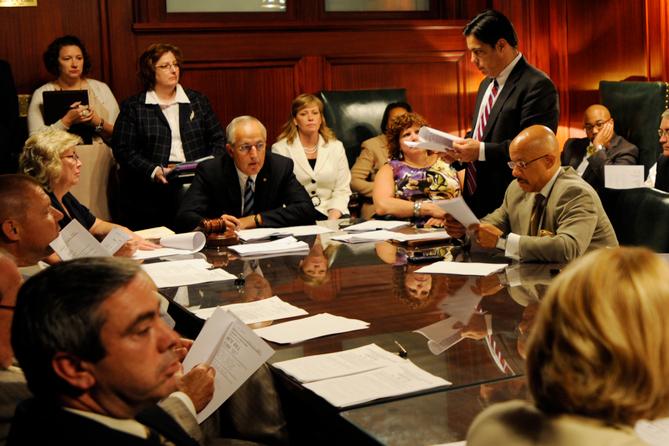HARRISBURG — To an outsider, it would have looked like just another vote.
The Pennsylvania House Gaming Oversight Committee met on the afternoon of June 26 to weigh a single proposal, SB 840, which would cut the number of legally required slot machines in some casinos. It had already been introduced in the state Senate, approved by the chamber in a narrow 26-24 vote.
The committee gaveled in, and after almost 20 minutes of debate, the bill passed with bipartisan support, 18-8.
But a plugged-in observer would have noticed the room was filled with lobbyists, staffers, and even a key budget negotiator — indicators something bigger was afoot.
According to three lobbyists who spoke to Spotlight PA on condition of anonymity, a likely scenario is for SB 840 to turn into a deal on skill games, the slot-like machines popular in bars and convenience stores that are currently unregulated and untaxed in Pennsylvania. Regulation of the games could be a key revenue component in this budget, but sorting out particulars has been tricky for lawmakers.
Having the bill queued up, which the committee vote made possible, could help.
“One chamber will run a quote, unquote ‘vehicle bill’ to get them loaded up … and it's shoved at members to vote on on the floor without them having been able to contemplate all the issues” state Rep. Russ Diamond (R., Lebanon), the ranking Republican on the committee, told Spotlight PA after the vote.
It’s still far from assured that SB 840 actually becomes a skill games deal, or part of the budget at all.
But other vehicle bills like it will certainly be part of a final budget deal. And if you want to understand how any large piece of legislation gets passed in Harrisburg, knowing how these bills work is crucial.
Vehicle bills make it possible for small groups of negotiators to reach agreements behind closed doors then quickly amend their preferred language into semi-related bills and get them to the governor’s desk — without giving the rank and file, special interests, or anyone else much time to engage in public debate. Sometimes, these groups aren’t even able to read the full language.
Defenders of the method say it’s not unique to Pennsylvania, and is necessary to seal hard-fought deals. One veteran Capitol staffer, given anonymity to speak candidly, told Spotlight PA that none of the contentious issues that make up any final deal are new to lawmakers or the public.
“Everybody who has a stake in the state budget has had months to argue for their position,” the staffer said. As such, vehicle bills are a way to ensure that when a deal comes together, “it’s ready to go.”
But critics argue that it’s an opaque, constitutionally questionable technique and enables last-minute additions with little accountability.
“How things get done determines what things get done,” said Tim Potts, a former Capitol staffer turned good-government advocate. He thinks the use of vehicle bills leads to a "compromised" process in which “you're not going to get a very good result.”
Added state Rep. Greg Vitali (D., Delaware): “I think it’s very basic that a House member has a right to know what he's voting on. That trumps other considerations.”
“Some members,” Vitali continued, “have no interest in that knowledge. Others do.”
How a bill (normally) becomes a law
To fight corruption and corporate influence within the General Assembly, a constitutional convention in the 1870s clarified how bills should become law.
The state’s charter now stipulates that bills must start in committee; contain only one subject; be considered on three separate days in each chamber before final passage; and that no bill “shall be so altered or amended … as to change its original purpose” — among other rules.
In theory, this lays out a clear path: A lawmaker introduces a bill, a standing committee approves it, and legislators in that original chamber vote on it after at least three days. Then this process gets repeated in the second chamber, and, barring a gubernatorial veto, that bill becomes law.
But this doesn’t take into account concurrence, the process through which the state House and Senate can agree to a bill that one chamber changed after it passed the other. And it's through concurrence that lawmakers can make lightning quick changes to a bill to pass a sensitive deal.
What’s concurrence?
Concurrence heavily involves two special committees that exist in both chambers, Appropriations and Rules. The Appropriations Committees must receive each bill and analyze its fiscal impact, and the Rules Committees must receive all bills that require concurrence.
This process makes two panels, both of them chaired by chamber leaders and otherwise filled with veteran lawmakers loyal to leadership, particularly powerful around the budget deadline.
“You have a real small subset of members that will control what's going to be in [a bill],” state Rep. Kerry Benninghoff (R., Centre), a former floor leader who helped cut budget deals, told Spotlight PA. “I think that's what frustrates members overall.”

Here’s how it works: The vehicle bill, say, a tax break for coal mines, passes one chamber, and is then referred to a standing committee in the other. That committee passes it, and after two of three considerations, the bill goes to Appropriations.
Once there, the bill can stay there for weeks, even months, until a deal is reached on whatever large issue leaders are hashing out. The two chambers may also pass the bill back and forth as they haggle.
Either way, once the leaders have a deal, they offer it as an amendment to a bill on a similar subject that is sitting in one of the Rules or Appropriations Committees — for instance, adding a jumble of new deductions for child care and student loans to the coal tax break. (That’s what lawmakers did as part of last year’s budget deal.)
The amendment will invariably be approved. Both chambers then have rules that require a delay — three hours in the House, 10 hours in the Senate — before a final vote as the new language is printed and presented to lawmakers. During the waiting period, leadership whips votes for the proposal to ensure it passes.
The chamber can then pass the amended bill, and send it to the other for concurrence. At that point it goes to a Rules Committee. That committee then approves the bill, setting it up for one last vote on the floor and the governor’s signature. The state House requires another three hour wait between the Rules vote and floor vote; the Senate does not.
Still, as long as a majority of each chamber agrees to the bill, a process that is constitutionally supposed to take at least six days can be shaved down to a few hours.
Are there any restrictions?
A handful.
The waiting periods in both chambers during the concurrence process are among them. But while they’re intended to provide a window for rank and file legislators to review bill language, some legislators argue it’s not enough time to collect meaningful feedback from outside groups with stakes in the legislation.
“This is particularly true around budget time, when controversial provisions are tucked in large bills such as the fiscal code at the last minute,” Vitali wrote in a memo he pitched several years ago that would have extended the House’s waiting period to 24 hours. (It failed.)
And even more critically, any chamber rule can be waived by a majority vote.
So “there’s really only one House rule,” Vitali said, “and it's if you have the votes you can do whatever you want.”
The state constitution also provides some protections.
The rule requiring bills to address only a single subject stops lawmakers from straying too far from any one topic. But “too far” is in the eye of the beholder. Normally, in order for a bill to be used as a vehicle for a key budget measure, the vehicle has to cover the same area of law as the intended real legislation.
A vehicle bill designed to become the budget’s education component, for instance, should deal with the public school code — though that restriction still leaves leeway for a crafty drafter to cram not-very-related measures into one bill.
If legislators aren’t careful, state courts do sometimes rule against their attempts to roll together measures into a single bill. That happened multiple times in the 2010s, including on a bill to repeal a state cash assistance program, and another making it easier for gun groups to sue municipalities over local gun laws.
Will “vehicle bills” ever go away?
Probably not — lawmakers will likely always find ways to pass bills quickly.
The anonymous veteran staffer told Spotlight PA that they didn’t think Pennsylvania lawmakers are unique in their desire to resolve big deals fast. Take Congress, which has no constitutional restrictions on its process. It passed the final form of President Donald Trump’s omnibus fiscal bill, at 330 pages, in a span of roughly 72 hours.
“Everybody knows there’s gonna be stuff they like and stuff they don’t like,” the staffer added. “Having those fights in public early does not help get the final thing done.”
But in practice, this secrecy also prevents deep public vetting of a deal by rank-and-file lawmakers, the press, interest groups, and constituents before the legislation has passed.
“Maybe we need to press our legislators a little bit more,” Potts said, adding: “‘Really? You think this is in the public interest to operate this way?”
Meanwhile, SB 840, the measure Capitol watchers widely expect to contain a skill games deal, is now in the perfect position to become a vehicle.
After passing out of committee in the state House on June 26, it advanced through its first two considerations in the chamber with no debate, and is now in the Appropriations Committee awaiting approval and a report on its fiscal impact.
Top lawmakers could amend it in that committee, send it to the full floor for a vote, then kick it over to the state Senate. From there, that chamber’s Rules Committee would be able to approve the bill for one last floor vote so it could go to the governor.
Lawmakers in Pennsylvania have been debating whether and how to regulate skill games for a decade. It’s still not clear if they’ll cut a deal for inclusion in this year’s budget.
But if they do, and if they use the vehicle teed up in the House, they could end that long legislative fight in less than half a day.
